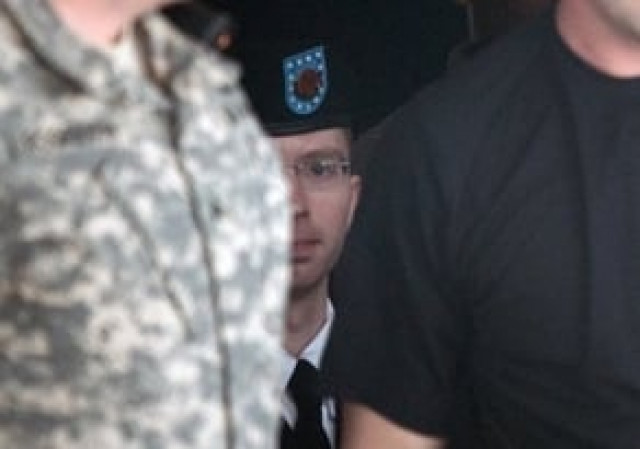US judge refuses to drop key charge against Manning
If convicted on all counts, Manning could face a prison sentence of more than 150 years.

A US military judge rejected a request to dismiss a key charge that an American soldier aided the enemy. PHOTO:AFP
The decision marked another setback for Bradley Manning, 25, the Army private on trial for espionage who has admitted to passing hundreds of thousands of classified military and diplomatic files to WikiLeaks.
Manning's defense lawyers had filed motions seeking the dismissal of the aiding the enemy count as well as a charge of computer fraud. But the judge, Colonel Denise Lind, said prosecutors had offered enough evidence to allow the trial to go ahead with the charges intact, pending a final verdict.
Manning maintains his massive leak the biggest in American history was meant to trigger a public debate about US foreign policy but he faces a potential life sentence if he is found guilty of deliberately "aiding the enemy."
The ruling also carries possible repercussions for the rights of government employees seeking legal "whistleblower" protections when they disclose classified or sensitive information.
Defense lawyer David Coombs had contended prosecutors failed to show that Manning had "actual knowledge" that by passing a trove of classified documents to the anti-secrecy group WikiLeaks he would be assisting al Qaeda, either directly or indirectly.
Lind, however, said the government had provided "some evidence" that Manning's training as an intelligence analyst "included a lesson on the terrorist use of the internet" and that "he was aware the enemy was engaged in similar activities."
Explaining her decision under court-martial rules, Lind said in weighing a defense request to dismiss a charge, "evidence should be viewed in light most favourable to the prosecution."
Although her decision does not prejudge Manning's innocence or guilt on the charge, it raised concerns among some legal experts and rights advocates.
"It's pretty disconcerting from a First Amendment perspective," said Mary-Rose Papandrea, a Boston College Law School professor.
"The government is equating all leakers with traitors and they're not," said Papandrea, adding that whistleblowers seek to shed light on wrongdoing while "traitors" seek to funnel secrets to adversaries.
At an earlier session, the judge asked if the government would have pressed charges if Manning had leaked the documents to a newspaper instead of WikiLeaks. The prosecutors said they would have still pursued the case.
Widney Brown, senior director of international law and policy at Amnesty International, called the ruling a "travesty of justice" based on a flawed interpretation of the law.
"What's surprising is that the prosecutors in this case, who have a duty to act in the interest of justice, have pushed a theory that making information available on the internet whether through Wikileaks, in a personal blog posting, or on the website of the New York Times can amount to 'aiding the enemy'," said Brown.
The Manning trial could have implications for the case of Edward Snowden, the intelligence leaker sought by US authorities for exposing far-reaching electronic surveillance by the National Security Agency.
And the court-martial also could influence the case of retired general James Cartwright, the former vice-chair of the Joint Chiefs of Staff who is a target of a probe of the leak that uncovered the Stuxnet cyber attack on Iran's nuclear program.
Under President Barack Obama, who came into office promising more transparency, authorities have indicted six current and former government officials in leak cases double the number brought by all previous administrations combined.
Manning's case represents the biggest leak in American history, with the documents proving an embarrassment to Washington and rankling allies.
The Army private has pleaded guilty to 10 lesser offenses that could result in up to 20 years in prison.
If convicted on all counts, Manning could face a prison sentence of more than 150 years.
Both sides are due to deliver closing arguments soon in the trial, which began in June.


















COMMENTS
Comments are moderated and generally will be posted if they are on-topic and not abusive.
For more information, please see our Comments FAQ